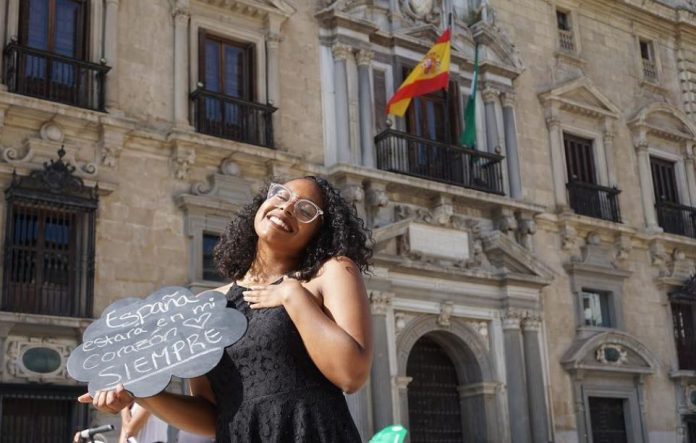When you think about Spain, what comes to your mind? Sun, beach, naps, wine, party? That’s a pretty common thing, as Spanish people have the same kind of already-held ideas about Americans. The first ideas Spaniards connect with the US are: fast food, Trump, Hollywood, NASA and freedom. Most of them imagine this country as a paradise of fame, money, business and basically a land of opportunities. For this reason, many students, like me, are coming here to live their American Dream, at least for a semester.
Studying in California sounds great: surf, beaches, sun… but Monterey isn’t exactly that way, is it? Ane landed from Spain to study at CSUMB during the fall semester. It took more than 18 hours flying, then a few more hours solving the immigration stuff and getting to campus – resulting in a very long trip. When she first arrived at the university that will be her new home for the next few months, she was expecting to live a typical Californian summer. However, she quickly found out Monterey is cold, so cold, more than she had never imagined, and she wished she’d brought more jackets because it didn’t seem like the series she saw on TV as a teenager.

Then Ane started meeting new people and, as a Spaniard, she leaned towards her new classmate to kiss, first the right then the left cheek. The boy stayed motionless, then she realized, “Oh damn! Here they don’t do this! All my mates will think I’m crazy!”
This is only one in a million of differences that Jalea (from California) also noticed when she was studying at Granada (Spain) last year, “Everyone in Spain is so close, even when they don’t know you.”
And that’s true, Spanish people’s personal bubbles are significantly smaller and they feel more comfortable with human contact in almost every situation. However, depending on the city, Spaniards are not as friendly and smiley as the people from California. Ane realized that in the few weeks that she had been in the US, more unknown people had started talking to her than what they would have in Spain for an entire year.
Even the streets felt different for her, as drivers always respect pedestrian’s space and stop pretty far from you to let you know that you are free to cross without risk. That’s not the case in Spain, actually, it is very common for Spanish drivers to yell at pedestrians for jaywalking.
The United States is a country made for moving by car, but for international students coming with the essential for a semester, public transport is the most common option. In this aspect, Ane was also shocked because of the low frequency of the bus and it’s long journeys to get to every place. In most of the Spaniard cities, you can get in a short walk to the main places but if not, you can catch buses every 15 or 30 minutes maximum for a very little cost (1€ or so).
As students, they also noticed some differences in class. For example, when Jalea started eating in one of her first Spanish classes, the professor got very angry and told Jalea that if she wanted to keep having lunch, she must “leave the classroom and don’t come back!”

Jalea was embarrassed because here, that is totally normal. That’s what Ane found strange as well, eating in class is not a Spanish norm. Here, here is more freedom to go in and out of the class. Ane had been enjoying her American freedoms in class until one day, she started smelling something weird in class. Shortly after, she found out one of her classmate’s was eating sushi during a lecture. She was completely astonished. She thought the professor would surely reprimand her, but when she looked at the professor, she found her professor was eating too!
Also, the amount of assignments and readings Americans do at home was too much for what Ane have expected. In Spain, you may have one or maximum two projects per subject and the most part of the grade depends on the final exam. Even in some classes where it is not necessary to assist every day, it’s possible to have good marks only with the exam.
Sometimes culture shock happens, but you can even find it funny. The advice these two students, Ane from Spain who is studying in America and Jalea in Spain who is from America, are giving to all of those that are thinking about exploring a new culture studying abroad for a while is: do it! It will be such an experience, with foolish and amazing moments that you will remember for your whole life. Don’t be afraid to live, learn and study abroad!




